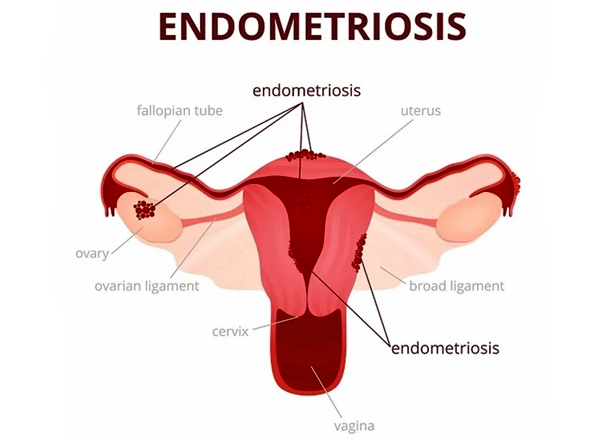
Endometriosis is a medical condition in which tissue similar to the lining of the uterus (endometrium) grows outside the uterus. This tissue can be found on the ovaries, fallopian tubes, and other pelvic structures. Endometriosis is a common gynecological disorder that can cause pain and fertility issues. Here are some key points about endometriosis:
-
Symptoms: The most common symptom of endometriosis is pelvic pain, which can range from mild to severe. Other symptoms may include painful menstrual cramps, pain during or after sex, abnormal menstrual bleeding, and infertility.
-
Diagnosis: The definitive diagnosis of endometriosis is often made through laparoscopic surgery, a minimally invasive procedure where a thin tube with a camera is inserted into the abdomen to visualize and potentially remove endometrial tissue. Imaging tests such as ultrasound or MRI may also be used to aid in diagnosis.
-
Causes: The exact cause of endometriosis is not well understood. Retrograde menstruation, where menstrual blood flows back into the pelvic cavity, is one theory. Other factors such as immune system dysfunction, hormonal imbalances, and genetic predisposition may also play a role.
-
Treatment: Treatment options for endometriosis aim to relieve symptoms and, in some cases, improve fertility. Common treatments include pain medications, hormonal therapies (such as birth control pills or GnRH agonists), and surgical procedures like laparoscopy to remove endometrial implants or lesions.
-
Impact on fertility: Endometriosis can affect fertility, but not all women with endometriosis experience infertility. The severity of the condition, the extent of tissue involvement, and individual factors all contribute to the impact on fertility. Some women with endometriosis may require fertility treatments to conceive.
-
Lifestyle and self-care: Managing endometriosis often involves lifestyle changes such as maintaining a healthy diet, regular exercise, and stress management. These practices may help alleviate symptoms.
-
Chronic condition: Endometriosis is a chronic condition, and there is currently no cure. However, many women find relief from symptoms with appropriate medical management and, in some cases, surgical intervention.
If you suspect you may have endometriosis or are experiencing symptoms, it's crucial to consult with a healthcare professional. They can perform a thorough evaluation, provide a diagnosis, and recommend an appropriate treatment plan based on your individual circumstances.
